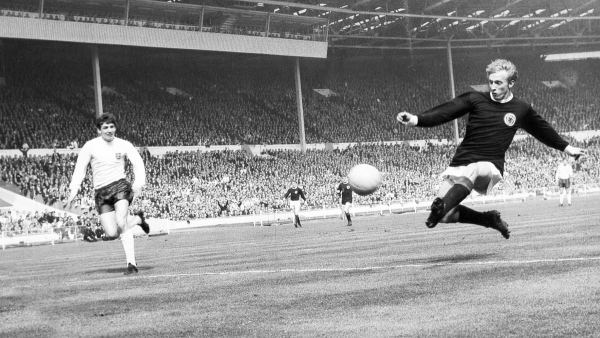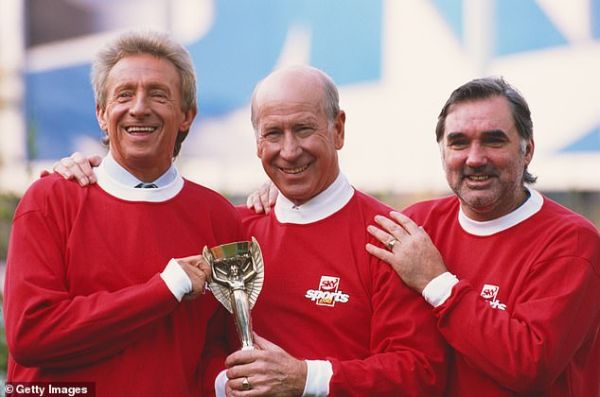
From pauper to king, from scuffles in the streets of Aberdeen to frenetic clashes at the top of world football, two episodes far from the glory of the playing pitch give an indication of Denis Law and his times.
First, that spindly frame was never nourished by plenty in his childhood. He was the son of a fisherman. At an event in the Scottish Football Museum Hall of Fame, seven decades after his birth, he spoke quietly but movingly of the privations of such a life.
Secondly, he was a footballer when players could be extraordinary stars but had to be connected to the ordinary world.
‘I had to earn a living,’ he explained in his autobiography when he told of his move to become a carpet salesman immediately on his retirement from the game. Thus Law, Scotland’s only Ballon d’Or winner, bowed gracefully to the realities of his life. And got on with it.
It is difficult to explain to younger generations precisely what Law meant to those who are now of pensionable age. We saw him fleetingly. He would feature on Match of the Day highlights, the annual game against England was televised live and that fixture at Hampden was attended eagerly.
But Law represented so much more than just sporting prowess. He was the acme of the young Scot who left home early seeking his fortune in another country. He was the prime example of that eternal story of the boy who becomes king by meeting and overcoming a series of challenges. His included eye surgery at an early age and withstanding the violence of the game of the sixties despite his obvious relative frailty.
Law (right) is the only Scotsman to have won the Balon d’Or, back in 1964
The Lawman represented his country at the 1974 World Cup, playing his part in a 2-0 win over Zaire
He overcame all this, of course, by talent and sheer force of will. Law was generous, self-deprecatory and gracious off the field. He was a force of nature on it. Centre halves so big that they came with their own weather systems would be buffeted and repulsed by the vibrant Scot. He was persistently brave in the face of violence and could respond in kind. There was and is no need to apologise for the latter tendency. It was a matter of survival.
His career, of course, was sustained by the currency of goals. One telling illustration of this talent came when Scotland beat England, then the World champions, at Wembley in 1967. A ball was spilled by Gordon Banks and the King pounced on it and scored decisively. This was his modus operandi. The strike with the stiletto rather than the blunderbuss from outside the area or the contrived mechanics of the dribble and finish. He could score any type of goal but the seizing of opportunity inside the box carried his DNA.
But Denis was more than a goalscorer. Indeed, he would gently protest in later life that he was more of a No.10 than a No.9, not just in shirt number but in role. However, his significance transcends any debate about precise working in a team. He is also lifted above his considerable achievements at Manchester United, and elsewhere, by his aura.
At a time when footballers were conservatively coiffed with square jaws – Bobby Charlton, Law’s peerless team mate, seemed to leave school and immediately land on the brink of middle age – Denis was impossibly glamorous.
He was exciting. His hair stood above his head as if he had just survived an explosion. He wore his shirt outside his shorts, clutched the cuffs, and his leanness was complemented by a meanness, at least to opposing defences.
He was predatory. He swooped to score. He glided around the box. Then pounced. It was impossibly exhilarating for the fan. The suddenness of his entrance into the game regularly prompted a gasp.
There was a geographical distance between Law and his country. He left young, never really to return. His exploits in England could only be accessed through the limited television coverage of the day. But this, at least to me, only increased his allure.
There was genuine excitement as a lad travelling to Hampden with the expectation of seeing the King in his pomp.

Law was part of Manchester United’s Holy Trinity, alongside Sir Bobby Charlton and George Best
He could be unlucky as a player. He missed Manchester United’s European Cup win in 1968 through injury and his only World Cup finals appearance came when he was on the wane physically.
But even then he represented much more than his diminished body. It was Scotland’s first World Cup finals in a generation and it was appropriate that this is where he made his last bow. He soon became a carpet salesman, the Ballon D’Or presumably gathering dust on a sideboard in his Manchester home.
He never really took to punditry. He never seriously considered coaching. His gifts as a player seemed purely natural, almost instinctive. This is not to under-estimate his considerable will and inner strength but it does emphasise that Law operated on a plane not easily translated on to a tactics board.
This wonderful fluidity was hard to explain but delightful to observe. Standing far above the Hampden pitch on those magnificently shambolic terraces, one could spot Law easily in the manner of an experienced ornithologist. There was that distinctive plume. There was that unmistakable movement. There was that lunge for his prey, the loose ball in front of goal.
As a child, he was the hero. ‘I’m Denis’ was the cry in schoolboy games. As a teenager, in 1973, I watched from the Hampden terrace yet again as we beat Czechoslovakia to make the World Cup in West Germany. As we bounced on the dirt, Denis Law cavorted on the pitch below.
As an adult, I met him, interviewed him and was inspired by his humility. He knew he had been a great player. He was told so on a daily basis. He had statues in Manchester and Aberdeen. But he knew, too, that there are other things in life. These included humour, a natural gentility and respect for others.
The sadness that many feel today, particularly of my age, is not just that Denis Law has gone. But that a representative of all that we loved in the game has departed.
Law was the King when as sporting nation we believed we were kings, if only for the odd day.
He brought excitement and joy. It is an epitaph reserved for special people. Thank you, Denis.